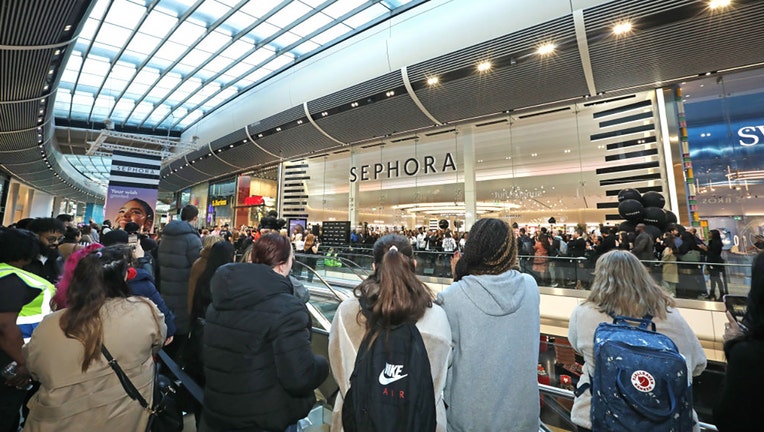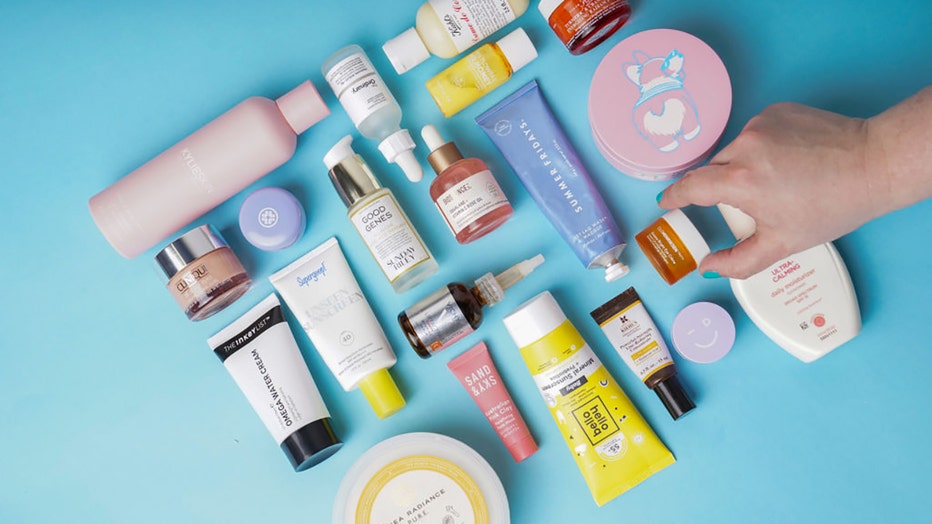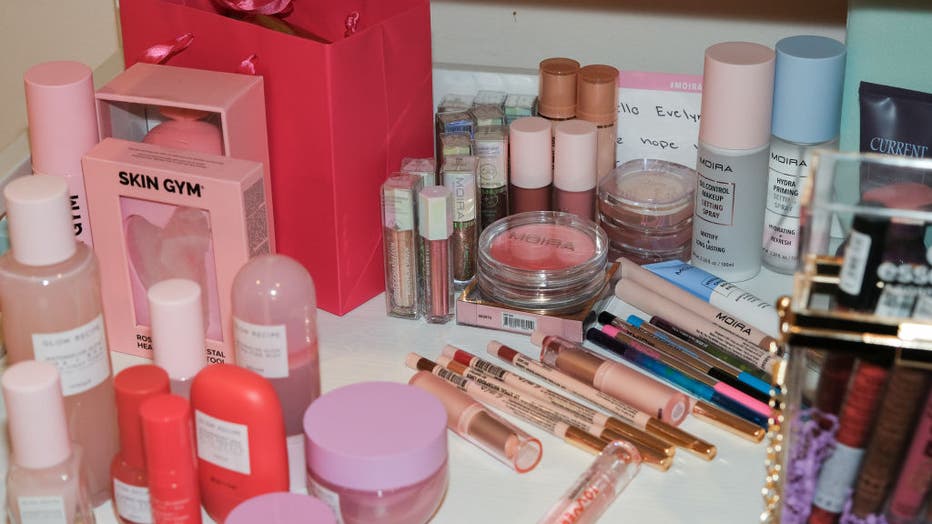The tween skincare market is booming, thanks to social media

FILE - A general view of the atmosphere at the Sephora UK Stratford Store Opening Day at Westfield Stratford City Centre on Nov. 15, 2023, in London, England. (Photo by Dave Benett/Getty Images for Sephora UK)
Many tweens and younger teenagers are interested in beauty and skincare products, a trend that’s been observed for some time now, but the holiday season only brought this obsession even more to the forefront – and companies have noticed, too.
For Christmas, many parents noted how their pre-teens weren’t asking for dolls or roller skates. Instead, kids wanted face masks, serums, and creams.
"Has anyone else with girls this age noticed this? My daughter and all of her friends are obsessed with skin care products and routines," one parent of a tween wrote on Reddit. "She has jade rollers, contour ice cube, mycellar water, lotions and serums etc. Anytime we go into a store she’s begging me to go to look at skin care products. I’m glad she’s religious about wearing sunscreen now but most of this stuff is beyond unnecessary."
The post received hundreds of replies, with many confirming a similar trend among their own tweens. Parents seemed both "baffled" by the pricey skin care obsession and also in support of a leisure interest geared towards self-care.
Tiktok's viral ‘10-year-olds at Sephora’
Elaborate skin care routines, which can include cleansers, toners, serums, and moisturizers, have risen in popularity among tweens in recent years. And children, mostly 13 and under – often referred to as Gen Alpha – have been flooding their nearest Sephora stores to get their hands on these products typically targeted at older consumers.
The phenomenon has led to viral discussions on TikTok about the surge of younger girls purchasing pricey items from brands like Drunk Elephant, Glow Recipe, and Sol De Janeiro.
Searching the #Sephora tag on TikTok pulls up video upon video of users commenting on the influx of young shoppers at the beauty retailer in recent months, including some Sephora employees venting about the related mess and alleged "entitled" behavior.
Similar to older beauty and skin enthusiasts, many children and tweens now post videos of their own skin regimens on social media – sharing their favorite brands and products with followers.
Adding to the trend, celebrity children like North West, the 10-year-old daughter of Kim Kardashian and Kanye West, and 11-year-old Penelope Disick, the daughter of Kourtney Kardashian and Scott Disick have posted videos of themselves on TikTok doing their elaborate skin care routines with expensive products.
Gen Alpha: the most plugged-in generation
Gen Alpha, which consists of those born between 2010 and 2024, was "basically born with an iPad in hand," noted Clarkson Consulting, a retail research firm.
As a result, this means that brands and content creators can have more direct influence over this youngest generation, compared to older generations.
"Having been exposed to social media early, Gen Alpha is relatively more image-conscious than older generations," Clarkson Consulting explained in a report on the subject last summer. "This means that the beauty industry can expect demand from a demographic that prioritizes new trends to remain up to date."
Previous research has suggested that roughly 68% of Gen Z and Gen Alpha combined have a skincare routine. Meanwhile, more than 50% of children between the ages 6 and 16 want to buy a product used by an online content creator or influencer, according to other previous surveys.
For skincare companies, the future looks bright thanks to Gen Alpha

FILE - Various skincare products are displayed in The Washington Post via Getty Images studio in Washington, DC on April 11, 2023. (Photo by Carolyn Van Houten/The Washington Post via Getty Images)
The tween skincare obsession all over social media has also been noticed by skincare and beauty companies too, which are utilizing micro-influencers and employing other Gen Alpha-style marketing techniques to develop lifelong consumers.
One example of this is Estée Lauder, one of many legacy brands that can struggle to stay relevant with younger age groups. In 2016, the company launched a millennial-focused lineup with more than 80 products and Kendall Jenner as the face. Comparatively, a campaign last year targeted toward Gen Z and Gen Alpha included only three products and was promoted with a TikTok campaign, according to the Business of Fashion, which offers fashion-related intelligence and analysis.
"This may speak to the ever-shrinking attention span of children and how it influences what they value," Clarkson Consulting said of Estee Lauder’s marketing strategy.
Circana, which offers consumer behavior and trend data, noted in its 2024 outlook for the beauty industry how Gen Alpha is "rapidly making their mark and will likely drive growth for years to come" in skincare.
The brand Drunk Elephant has particularly benefited from the skincare craze among tweens, even noticing a bump in followers on social media, according to founder Tiffany Masterson.
"I think we’ve tripled the follower growth," Masterson said on a recent episode of the "Gloss Angeles" podcast.
Pre-teen obsession with skincare: Helpful or harmful?
The popularity of some of these skincare products, which can include anti-aging ingredients, has led to many dermatologists and beauty professionals to warn about the potentially negative impact on children’s young skin.
"Most of these products have ingredients in there that are anti-aging, exfoliating, which do not sit well on young, young skin," warned makeup artist Alicia Anderson in one highly-viewed TikTok video.
Board-certified dermatologist Dr. Brooke Jeffy, who often posts TikTok videos centered on tween and teen skin care, noted in a recent video how products applied to the skin "have consequences and can affect how it functions."
"Kids are storming Sephora to get products to fit in, not because they have any idea how things work or what can happen if things go wrong," Jeffy said.
"Parents, you may not understand the intricacies of skin function, but at least steer your kids to brands made for kids that focus on maintaining healthy skin or addressing acne," Jeffy continued, noting how "less is more" when it comes to tween skin.

FILE - Various beauty and skincare products are seen displayed on a table. (Arin Yoon for The Washington Post via Getty Images)
Drunk Elephant has noted online that not all of its products are designed for young skin, including more potent ones that include acids and retinols. Last month, it shared a list of its products "that are safe for kids and tweens to use" on a recent Instagram post in the lead-up to Christmas.
It also shared a simple routine "that doesn’t require many products," including a cleanser and following with a few drops of its $38-$68 Virgin Marula Oil or 1 pump of its $62 Lala Retro "for balance and moisture."
"Sunscreen daily is a must for any age," the brand noted.
To Masterson, who launched Drunk Elephant in 2013 as a six-product line on her website, there are both pros and cons of younger kids learning about and seeking out skin care products.
"I think that part of it is good, that they’re learning and they’re educating themselves, and they have that self-care thing going, and I think that can’t be a bad thing," Masterson said on the "Gloss Angeles" podcast episode. "We just need to be clear on which products are for who and what’s appropriate."
This story was reported from Cincinnati.

